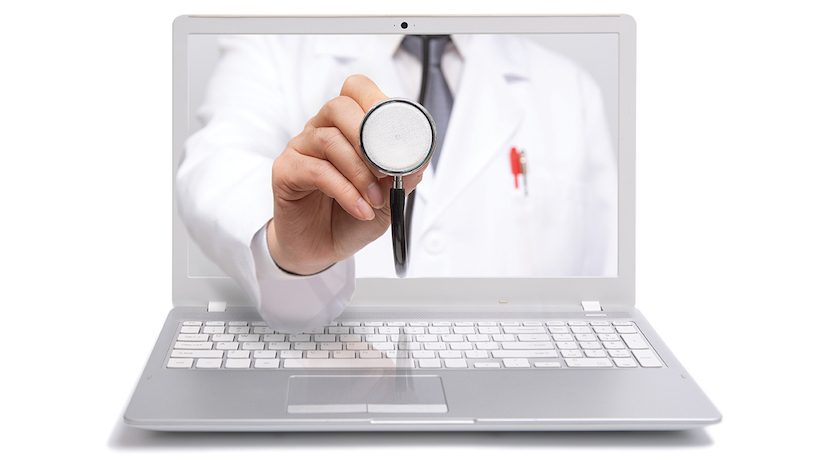A few short (and long, simultaneously) months ago, a doctor’s waiting room was the most mundane place in the world. But today, sitting next to another patient and flipping through a magazine while you wait for your name to be called is almost unimaginable. As COVID-19 has changed so much about how we live, communicate and even see our doctors, the sudden popularity of telemedicine has doctors trading in their stethoscopes for webcams.
Luckily for us, South Jersey doctors were ready for the change, and there are a few things they want you to know.
It isn’t perfect (yet), but that’s ok
As offices transition to telemedicine, there are bound to be bumps in the road.
“Many providers have been moving toward telemedicine in a slow and calculated fashion before COVID-19,” says Gregory Herman, MD, a family medicine physician with Inspira Medical Network. “We aren’t starting from scratch, but we don’t have everything completely figured out just yet.”
On the work-in-progress list are difficulties measuring vitals before an exam. Not every patient has the correct materials to record blood pressure, height, weight and temperature at home, so medical providers are being more flexible. Smart watches that can measure a patient’s pulse, or even a “mom-mometer” (aka, the back of your mom’s hand on your forehead to see if you feel hot), can give valuable information in an exam. While that may be fine for now, it isn’t a permanent solution, says Herman.
Many medical issues require additional physical testing that cannot be diagnosed over telemedicine, such as ear infections, breathing issues or abdominal pain, Herman notes.
“In those instances, we’d still have to bring the patient to the office for an in-person visit,” he says.
It’s not new
For many patients, this is the first time they’ve video-conferenced with their physician, but that doesn’t mean the technology is new.
“The Coronavirus pandemic has accelerated telemedicine,” says Tudor Jovin, MD, medical director at Cooper Neurological Institute. “For several years, telemedicine has been an important tool in evaluating patients with medical conditions where the expertise may not be available in community hospitals.”
For smaller hospitals in remote parts of the world, for example, it’s been a literal lifesaver. “It’s been a great way for community hospitals to avoid unnecessary transfers and offer patients medical care that they may not have access to locally,” he adds.

You’ll still get top-notch care
With telemedicine, a healthcare provider cannot be in the room to examine patients, but physicians are finding that in many circumstances, touch is less important than you’d think.
“With a lot of medical conditions, diagnosis isn’t physical at all,” says Jovin. “Many examinations involve talking to the patient about their symptoms, their illness and injury history, and their family history. There’s no need to be in the same room.”
When conducting telemedicine visual examinations, physicians can, for example, observe the way muscles are (or are not) functioning by watching the way patients move or diagnose a head injury by monitoring eye movements.
“Studies have shown,” Jovin notes, “that telemedicine examinations have very similar outcomes to in- person visits.”
Treating kids is a different story
In the world of medicine, treating adults and children is not the same.
“With COVID dominating the news cycle, parents think every cough or sneeze could be the virus,” says Tanya Kadrmas-Iannuzzi, DO, chair of pediatrics at Rowan University. “Telemedicine is a great tool to reassure parents about their child’s health concerns.”
But that doesn’t make it easy.
“It’s difficult for kids to warm up to a physician in normal circumstances, and having an added separation on the computer makes it even tougher,” she says. “But the more we talk and acknowledge that the change is weird, the more they’ll open up.”
It also requires some tricky camera work.
“We’ll tell kids to look into the camera and say ‘ahhh,’ tilt your nose so I can see if you have boogers, clap real high or touch your shoulders to your ears to test muscles, or we’ll ask parents to manipulate the camera to see a rash,” says Kadrmas-Iannuzzi. “And when you have a squirmy kid, especially if you’re trying to hold the child and the camera at the same time, it can definitely be difficult.”
But in other ways, pediatrics is perfectly suited for telemedicine visits.
“A lot of pediatric visits are simply conversations,” says Kadrmas-Iannuzzi. “Treating issues like mental health, anxiety, depression, ADHD and learning issues through telemedicine aren’t necessarily different than having the patient in the office.”
Find Four Ways to Make the Most of Your Telemedicine Appointment
It’s probably going to stick around
Even after the Coronavirus outbreak fades, more doctor visits will be conducted by video camera than ever before, Herman says.
“Even beyond the pandemic, people are going to realize how convenient it is,” he adds. “They won’t have to take time off from work to commute to a doctor’s office and sit in a waiting room. The same care can be delivered in a fraction of the time.”
While providers emphasize remote appointments as a way to limit exposure to COVID-19, that doesn’t mean that all in-person services are unavailable.
“With the extreme safety and security measures hospitals are taking to cut down COVID-19 exposure, our facilities are safer now than they have ever been,” says Herman. “If you do need to come in for a physical exam or test, you’ll see limited exposure to a waiting room and extremely sanitized facilities. A nurse or physician can even come to your car in the parking lot if you don’t feel comfortable coming inside.”
“We aren’t mandating telemedicine,” he continues. “We are using this as another way to provide care quickly, safely and efficiently.”














